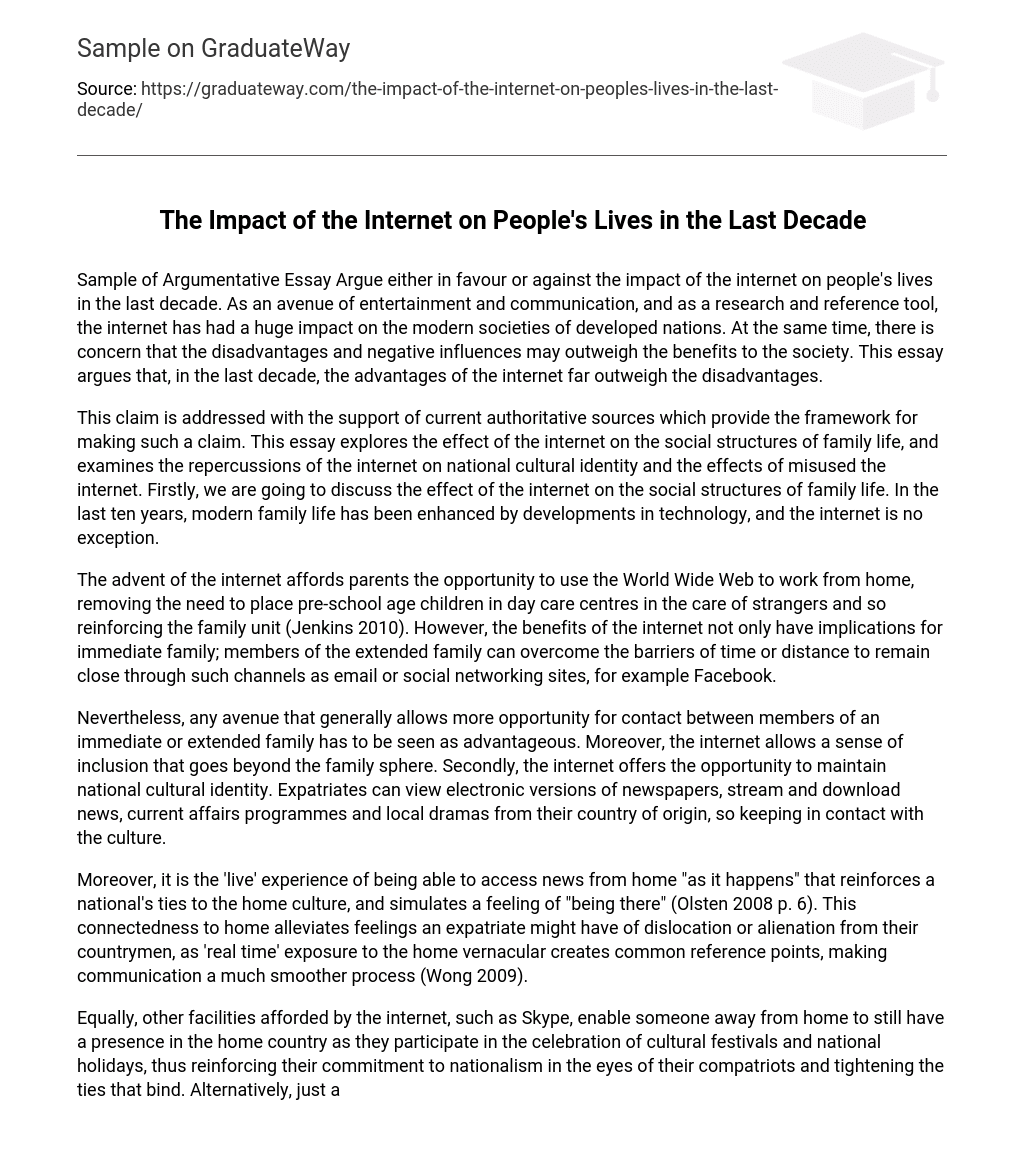Sample of Argumentative Essay Argue either in favour or against the impact of the internet on people’s lives in the last decade. As an avenue of entertainment and communication, and as a research and reference tool, the internet has had a huge impact on the modern societies of developed nations. At the same time, there is concern that the disadvantages and negative influences may outweigh the benefits to the society. This essay argues that, in the last decade, the advantages of the internet far outweigh the disadvantages.
This claim is addressed with the support of current authoritative sources which provide the framework for making such a claim. This essay explores the effect of the internet on the social structures of family life, and examines the repercussions of the internet on national cultural identity and the effects of misused the internet. Firstly, we are going to discuss the effect of the internet on the social structures of family life. In the last ten years, modern family life has been enhanced by developments in technology, and the internet is no exception.
The advent of the internet affords parents the opportunity to use the World Wide Web to work from home, removing the need to place pre-school age children in day care centres in the care of strangers and so reinforcing the family unit (Jenkins 2010). However, the benefits of the internet not only have implications for immediate family; members of the extended family can overcome the barriers of time or distance to remain close through such channels as email or social networking sites, for example Facebook.
Nevertheless, any avenue that generally allows more opportunity for contact between members of an immediate or extended family has to be seen as advantageous. Moreover, the internet allows a sense of inclusion that goes beyond the family sphere. Secondly, the internet offers the opportunity to maintain national cultural identity. Expatriates can view electronic versions of newspapers, stream and download news, current affairs programmes and local dramas from their country of origin, so keeping in contact with the culture.
Moreover, it is the ‘live’ experience of being able to access news from home “as it happens” that reinforces a national’s ties to the home culture, and simulates a feeling of “being there” (Olsten 2008 p. 6). This connectedness to home alleviates feelings an expatriate might have of dislocation or alienation from their countrymen, as ‘real time’ exposure to the home vernacular creates common reference points, making communication a much smoother process (Wong 2009).
Equally, other facilities afforded by the internet, such as Skype, enable someone away from home to still have a presence in the home country as they participate in the celebration of cultural festivals and national holidays, thus reinforcing their commitment to nationalism in the eyes of their compatriots and tightening the ties that bind. Alternatively, just as the internet serves to strengthen national identity, it can also provide a point of reference for those who live in a multicultural context. Thirdly, the tendency of misused the internet.
Despite the many advantages of the internet, there are certain cons and dangers relating to the use of internet especially on the personal information, pornography, and spamming activities. If you use the internet, your personal information such as your name, address, etc. can be accessed by other people. If you use a credit card to shop online, then your credit card information can also be ‘stolen’ which could be akin to giving someone a blank check. Next, pornography is a very serious issue concerning the internet, especially when it comes to young children.
There are thousands of pornographic sites on the internet that can be easily found and can be a detriment to letting children use the internet. In addition, spamming refers to sending unsolicited e-mails in bulk, which serve no purpose and unnecessarily clog up the entire system. If you come across any illegal activity on the internet, such as child pornography or even spammers, then you should report these people and their activities so that they can be controlled and other people deterred from carrying them out.
Such illegal activities are frustrating for all internet users, and so instead of just ignoring it, we should make an effort to try and stop these activities so that using the internet can become that much safer. In conclusion, this essay explored the effect of the internet on people’s lives in the last decade and found that the advantages of the internet far overshadow the disadvantages. It found the internet has had positive effects on family life, allowing the hands on parenting of pre-school children by those parents who are able to use the internet to work from home.
In addition, it has reinforced the extended family by harnessing email and social networking sites as a means to stay in direct contact. Another positive effect of the internet is its ability to re-assert national identity, particularly for those living abroad, as they retain remote access to the home culture by being able to download or stream current affairs or local drama. Arguments which support the negative impact of the internet on people’s lives in the 21st century focus on very narrow aspects and fail to acknowledge the broad range of benefits the internet has borne on contemporary society.





